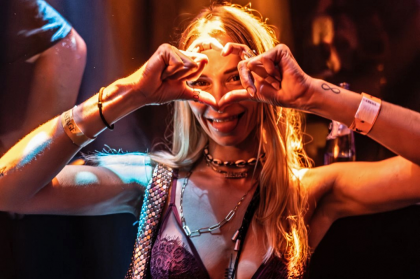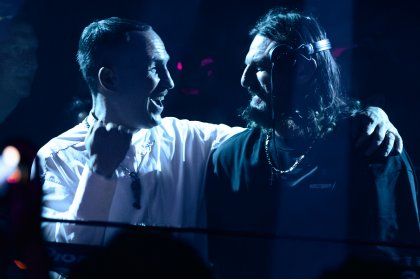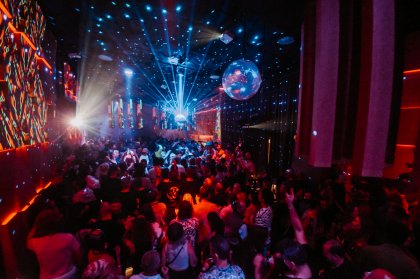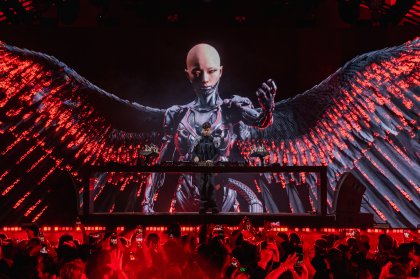It's been a duty of mine to snatch up an interview with the Kaiser Chiefs for eight years - yes, eight years ago would have made me only 12 years of age, but that was the year the tune ‘Ruby' was so famously released. You might think that's not much of a big deal, but as a Ruby myself, I've had “Ruby Ruby Ruby Ruuuuuby” sung at me in every, and any, situation for the past eight years. And since then, the question has hung at my lips - why? So as I sat at Pikes awaiting the arrival of the band, I felt a sense of ease - perhaps I was finally about to get an explanation, and maybe even a personal apology.
All ranting aside, the Kaiser Chiefs are a band that could be seen on a '100 reasons why Britain is great' list. Every one of their songs holds some sort of memory for most 20-year olds and they've managed to produce quality indie music for the whole time they've been together, which is an impressively long time when you look at the sell-by date of most bands. The Chiefs are also known for playing at one of the first Ibiza Rocks gigs way back in the day, a party that continues to hold its legacy for being the home of live music on la isla.
I got to meet The Kaisers because they were in town to headline yet another Ibiza Rocks gig, and consequently the venue was the busiest I'd ever seen it. It felt almost personal when I watched the band live, with frontman Ricky Wilson putting on a show that made me question if anything had changed from when they first started out - they were energetic to say the least. Their friendship and hard work shone throughout the performance - every song made me reminisce about my teenage years, and I was reminded of how many absolute belters they'd provided us with over the years. The crowd bounced, the band leapt from speaker to speaker and I finally heard 'Ruby' live, for hopefully the last time I'd ever have to hear that melody... another Ibiza memory in the bank.
But, back to the interview. Earlier in the day I'd been sitting on the tennis court at Pikes, where I was joined by Ricky and Simon Rix, the band's bass guitarist. I commented on their 'hard' lifestyle as we basked in the sun, to which Ricky retorted, “It's funny you say that, cause I have a tendency to go home moaning. I used to watch Pop World and you'd see these celebrities moaning about getting up at 4 AM and I'd say, 'you're in a fucking band, cheer up! But you get used to anything I suppose.” You're right, Ricky - you do get used to anything - I´ve just about got used to being sarenaded everyday and I'm now ready for my apology...
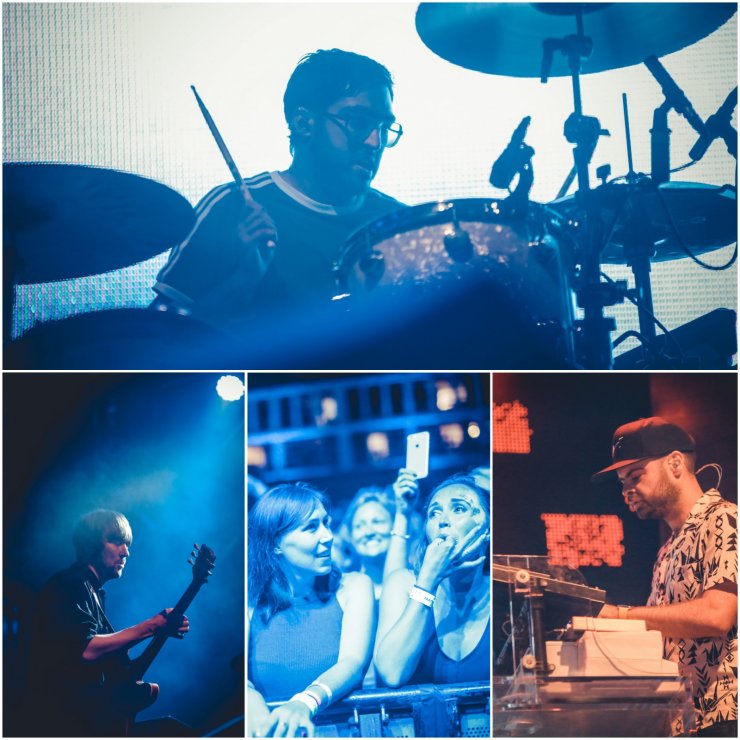
So, Ricky, did you ever think of the affect you would have on the Rubys across the globe after releasing 'Ruby'?
Ricky Wallace: "Yeah sorry about that…a lot of young girls and dead dogs are called Ruby, because the people that names their dogs Ruby at that time are getting old now, all the kids are starting to come to the shows and they're like 'this is Ruby' and I'm like 'Ah! We wrote a song called Ruby', and they go 'Yeah we know, we named her after your song!' It was the most popular name that year for girls. The most popular name for boys was I Predict a Riot… funny if there was a little lad called Riot running around. Good name for a little boy actually."
Simon Rix: "I once met a dog called Kaiser actually…"
RW: "I once got a letter about bullying from a little girl, so of course I replied. It read 'I get bullied at school, you brought out a song called Ruby, so thanks for that. I'm also ginger.” I replied telling her I never let being ginger get in the way. There's nothing wrong with being ginger by the way, but I'm definitely strawberry blonde."
So when was the first time you guys came to Ibiza? Were you playing or clubbing?
SR: "We played the first Ibiza Rocks in the back room of Manumission. At the time guitar music was kind of 'happening' in the UK - The Killers were doing alright, and we'd just done the NME tour."
RW: "We'd just arrived for our first time in Ibiza and there were billboards with my face on it, which was weird because we'd never really been here before. It was kind of a mythical place because obviously we had grown up watching late night programmes on Ibiza and how mental it was, and then suddenly we were here, playing a gig in a small back room at Manumission. Kate Moss was side of stage and we just thought, 'this is it lads, we've made it!' I watched the sunrise and Nick - the drummer at the time - and I were at the top of two pole dancing poles watching the sun rise over a park, it was amazing. Then I went home and sat at the pool and read a Dan Brown book. I didn't wanna stay up boozing so I just read a book! It is amazing though, I've got loads of good memories from Ibiza."
Do you have an opinion on the clubbing scene here in Ibiza? Do you ever venture out to the clubs?
RW: "No not really, we grew up in a different scene. It's nice that we come to Ibiza and I think Ibiza Rocks made that possible for us, but we never really grew up in that world. We grew up with indie discos and dancing to '60s music - we were Britpop era so we were never about clubbing."
SR: "I don't do enough clubbing to really make a comment, but I feel like when we came for the first time it was someone trying to do something different, because I think dance music was slightly in decline and guitar music was very much 'the thing' - that's where Ibiza Rocks came in. Since then, dance music is back massively, and there are less genres because everyone listens to everything!"
RW: "Probably because of things like Spotify, we're not so gang orientated - we can dip into everything. I went to Rocks on Sunday to see Craig David's TS5 pool party - I've met him a few times and I like him so I went to see what the fuss was about. I didn't really think about it when I answered your question but I've changed a lot. Back in the day I just wouldn't have been interested but I'm like, people are raving about it so it must be good, and it was! Everyone is a lot more open to experiencing different things. With the new record we've switched it up a bit because that's more fun - any criticism we get with our new material, people go 'oh they've really changed' and yeah, in a decade, of course we've changed. Imagine if we were made the same record as the first one, seven times in a row."
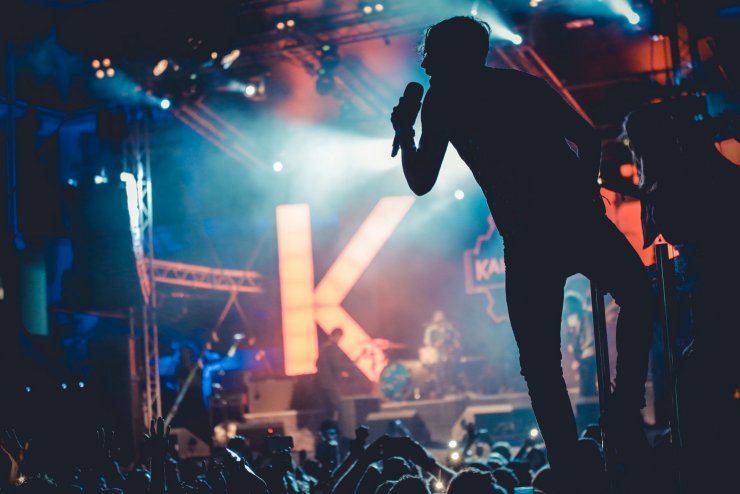
How would you say the new record has changed?
RW: "Each record is completely different. We've made six studio albums and the way we've approached making them has been entirely different each time. That's probably why we are over a decade into our career, because there's always something new to do. It's not like we've just re-visited the same studio and sat in our favourite chair and written the same way - even the writing process has been different every time - sometimes by choice, sometimes by force, like when Nick left. This time it's been a completely different writing experience because of the help from Brian Higgins - he's got a way of doing it that's very interesting, intense and really exhausting! It was easy in some ways because he takes out the bits of writing that we don't like - he knows when something is good - whereas we have to come to that conclusion over six months. It's great to work with someone who's blunt, because the further you get into your career, the more people are afraid of telling you that you're not doing it very well."
SR: "He's never really told us anything bad to be honest. He gets you to play and sing for massive amounts of time, and then when you do something he thinks has a bit of magic, he gets it, then moves on really fast."
What would you say you're most proud of with the band?
RW: "Not the fact that we're still going, cause that's obviously really good, but the fact we've had the rare privilege of being able to have a career. Careers have ups and downs - you can't zoom along - you've got to remember you're only as good as your last thing, and you've got to keep fighting. We've had albums that haven't done as well but we don't just pack up our bags."
So what is it about the Chiefs that have kept them together for so long, do you think?
RW: "The main thing for me is that it took so much energy and nearly destroyed us making it happen the first time - you've got to remember what you've been through, and go, we've put in all that work, why would we walk away from it? No one is interested when you first started - you were doing everything you could - making your own flyers and t-shirts, handing them out at the gig and then running around the back and getting changed behind the stage! You'd do anything it took. Three years ago I did The Voice and it wasn't that easy, but we recognised that I was alright at doing it - I could string a sentence together so I could probably do it. Everyone in the band is good at doing something. All bands go through a period of one person wanting to leave, and as long as it's just one person, you're fine, because if you all fall through the cracks at the same time, I can't think of anyone who wouldn't regret it."
SR: "I think it's weird for four, five grown individuals to just get on and do something that's great. It's a great thing to play music in front of people and make records - to be creative. But some people just can't get on."
RW: "It's like relationships - on the outside everyone looks like a perfectly good couple, but relationships are rocky and it's all about keeping it together. It's the same with bands - it's never perfect. Everyone has different ways of working through it - Peanut likes to talk it through, I like to leave the room! I just leave the room until people know I'm right!"
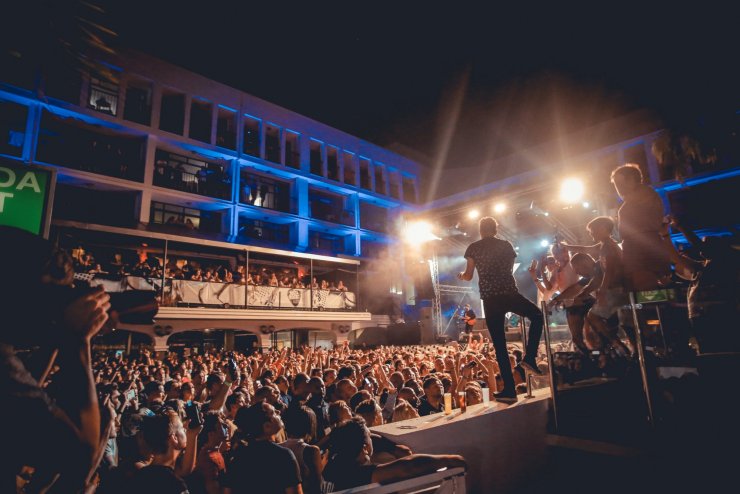
You mentioned The Voice, as your role on the show had a negative or positive impact on the band?
RW: "A positive impact because I was on TV a lot more and I could slip in 'I'm the guy from the Kaiser Chiefs'. The reason to do it was to get on TV, and it's been really good. Profile is what it's about really - when I first started I thought it was really good for the band, but it turned out I really enjoyed it!"
Dave Grohl has been quoted saying he thinks singing competitions are not what music is about - what would you say to that?
RW: "Well he's really good friends of ours so it doesn't apply to us! It's funny because we got on The Voice and then we went on tour with them. When The Foos do big tours they sometimes take us with them because we're easy to get along with and we whip up the crowd. We're a good support act - in fact we were worried at one point that we were gonna be support act forever - but we broke out of that. We set off, then went for dinner and I said, 'have you heard about The Voice?' and he said “Well, my friends can do it,” so that was good!
SR: "He understands why you need to do something different with music - it's not just a matter anymore of sticking the record out and seeing what happens - it's a completely different landscape to what was."
Your albums, 'Unemployment' and 'Education, Education, Education & War', suggest you're quite political when it comes to music, would you agree?
RW: "It's like no one's ever really noticed that we're political. You get loads of guys saying 'no one ever writes protest songs anymore' - our last album was pretty much an anti-war album. It's not like we're going around in marches and stuff, because the message 'war is shit' doesn't really shock anyone anymore. It's not like were saying anything outrageous - it's more of a social commentary than anything else. We're not writing campaign songs, we're just doing what's right for us. This album we've just finished writing is what we're interested in now. It's still pop politics but it's not internal politics. We like to think that the world is a great place and we all look after each other, but in reality it's not really like that - especially since Brexit. We've tried to write songs that have a universal appeal, and people really like that. There's a reason all the songs on the radio are love songs. This record is kind of a relationship record - it's about struggling to stay together. It's not the sexiest thing to write about - monogamy - but it's what a lot of us struggle with on a day to day basis."
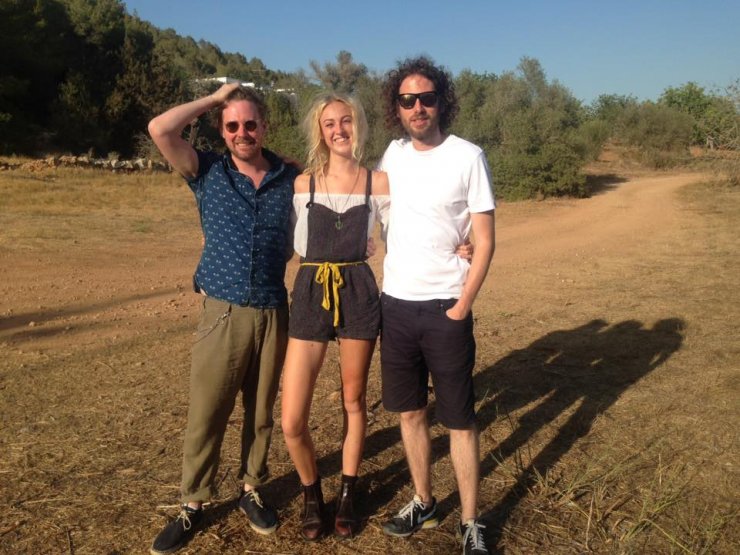
WORDS | Ruby Munslow PHOTOGRAPHY | James Chapman


